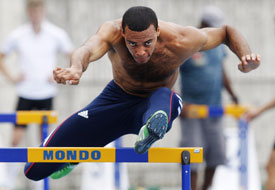What makes these championships so important?
Sports reporter Keme Nzerem explains why the 13th World Athletic Championships mean so much to Great Britain.
It is to all intents and purposes a dress rehearsal for London 2012.
The Athletics World Championships are where the biggest stars of track and field make their names, before staking their reputations at the “biggest show on earth”.
Athletics reliably deliver the flagship events of the Olympics. There’s now less than a year to go until the next one. And the 100 meters final is a case in point.
Who can forget the spectacle of Jamaican Usain Bolt cantering to victory in Beijing – and then shattering his own world record again at the World Championships a year later… with his shoelace undone.
And what about the Usain Bolt of distance running, Ethiopian Kenenisa Bekele – he’s been 10,000m world champion since 2003, and Olympic champion since 2004. In fact he’s never been beaten. Against that benchmark the British team have assembled a roster of talent both young and experienced.
They number defending world champions like heptathlete Jessica Ennis and triple jumper Philips Idowu; European champions like distance runner Mo Farah and 400m hurdler Dai Greene; and there’s new faces too: the likes of 22-year-old Perri Shakes Drayton – like Greene a 400 hurdles specialist – who also came first in the UK trials for the 400 flat; and British record holder in the 100 hurdles Tiffany Ofili Porter, raised in the USA but born to a British mother.

The results table on September the 4th will tell us how far British athletics has come since the disappointments of the last few years.
In Beijing the team came home with just four medals. Just one of them was gold – Christine Ohurugu in the 400m.
To put that into context, Britain’s cyclists won 14 medals, of different hues – Sir Chris Hoy taking 3 golds for himself alone’
British track and field Olympians haven’t won more than 10 medals at a single games since Tokyo in 1964 (discounting boycott years). And guess what the target is for 2012? 10.
But first they have to perform at the World Championships. Officially, UK athletics’ head coach Charles van Commennee won’t be happy unless they return with seven gongs.
Unofficially the number needs to be at least 10 – with as many as four of them gold.
At the last world champs in Berlin they managed six medals in all. In 2007, just five. And in 2003, a measly three.
Why do we watch athletics? Suspend for a moment the eternal doping concerns, for this tournament as always there are high profile competitors who’ve recently failed drugs tests. But for sports fans track and field is the very essence of physical competition.
In the simplest of playground challenges – who can run the fastest? Who can jump the highest? Who can throw the furthest?
Team GB have their work cut out to persuade the British public that London 2012 will be a celebration of British sport as much as a global party in our back yard.
Nine billion quid is a lot of money for a sports tournament. And UK athletics has been ruthless in its pursuit of success. The head coach is famously direct, and isn’t scared of withdrawing funding, and brutal public criticism of underperforming stars. The British public wants and deserves medals.
The World Athletics Championships are the only real test before London’s Olympic starter’s gun is fired once and for all.
-
Latest news
-
As India goes to the polls in the world’s largest election – what do British-Indians think?6m

-
Tees Valley: Meet the candidates in one of the biggest contests coming up in May’s local elections4m

-
Keir Starmer says public sector reform will be a struggle7m

-
Nicola Sturgeon’s husband Peter Murrell charged with embezzlement of funds from SNP1m

-
Ukraine might finally get $60billion in American weapons and assistance to defend against Russia3m

-





